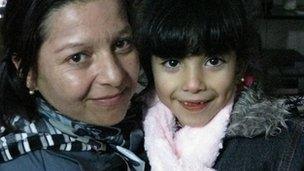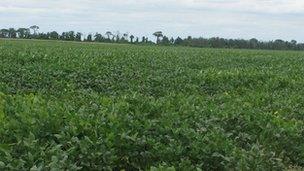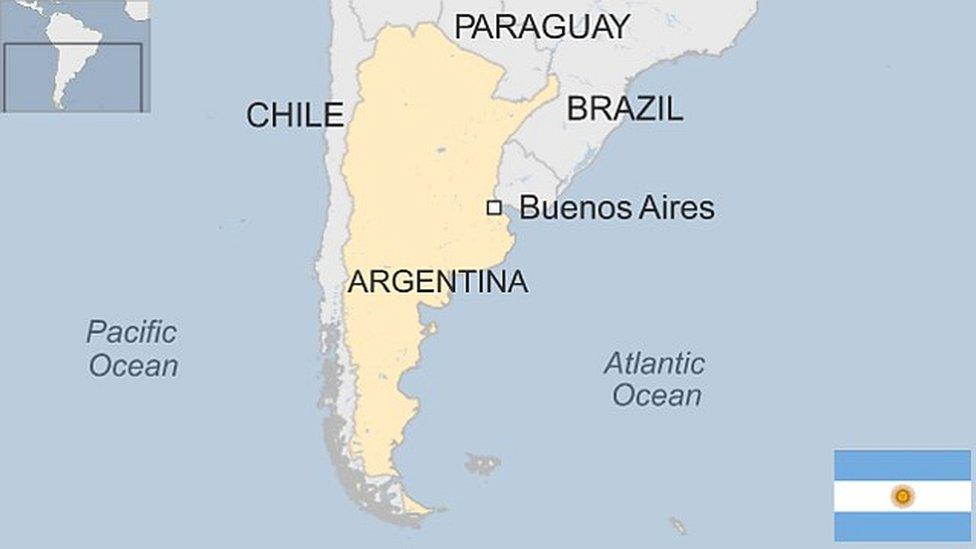Argentina court case highlights use of herbicides
- Published

Susana Marquez belongs to a local group opposed to the use of herbicides and pesticides
Susana Marquez has had 17 miscarriages. Her only daughter, Lourdes, who is seven, has a serious heart condition that could affect her growth.
Ms Marquez, who lives in Argentina's central farming belt, is adamant their health problems are the result of living close to a soybean field that since 2001 has been regularly sprayed with chemicals.
"There was one year, before Lourdes was born, that I lost my baby. Later I found out that five other women on my street, who were also pregnant, had also suffered a miscarriage," she says.
Ms Marquez and other local residents have long campaigned for their arguments to be heard.
Now, a trial currently taking place could result in a key ruling about the use of herbicides and pesticides in Argentina, whose economy is heavily dependent on agricultural commodities.
Two farmers and a pilot are on trial in Ms Marquez's home town Ituzaingo Anexo, on the outskirts of Cordoba, accused of violating local regulations that prohibited the use of chemicals near residential areas.
The court's verdict is expected on Friday. If found guilty, the defendants, who deny the charges, could face up to 10 years in prison.
"This is the first trial in Latin America that has reviewed the use of farm chemicals. We're trying to prove that there has been illegal pollution in this community," says public prosecutor Carlos Matheu.
Defence lawyers say the evidence against their clients is weak.
If a guilty verdict is returned, Mr Matheu says he will ask the government agency responsible for regulating the use of chemicals to review how it classifies their toxicity.
Such a move could reshape the agriculture sector in Argentina, the world's third biggest exporter of soy.
The outcome of the case is also likely to attract interest in neighbouring Brazil and Paraguay, also important commodity producers.
Agriculture has been behind Argentina's economic growth in the past decade - and the sector is heavily dependent on herbicides and pesticides to boost productivity.

"It is true that this trial could set a precedent that will change the use of farm chemicals here. But this is only a stepping stone. The real aim of this legal process is to prove that farm chemicals constitute a hazard for people," says Mr Matheu.
The question of the health effects is being considered in a separate judicial inquiry.
The inquiry is analysing whether there is enough evidence to try the same defendants for using farm chemicals that could have contributed to health problems and deaths in Ituzaingo Anexo.
The prosecution has included several scientific documents that support the argument that there is a link.
These include a study by Andres Carrasco, director of the molecular embryology department at Buenos Aires University, which was published in 2010 in the US journal Chemical Research in Toxicology.
If the inquiry, which is set to take several months, deems there is sufficient evidence, a trial will go ahead.
The Chamber of Agricultural Public Health and Fertilisers (Casafe), which represents companies that sell farm chemicals in Argentina, says herbicides and pesticides used in the country meet international safety standards.
"We are convinced of the safety of our products, when something goes wrong it's because they have not been used properly and therefore we invest a lot of time training farmers," says Juan Cruz Jaime, director of Casafe.
"The World Health Organization classifies the toxicity in farm chemicals in colours - red being the most dangerous and green the most environmentally friendly."
Some 83% of the herbicides and pesticides used in Argentina are classified as green, including the most common, glyphosate, Mr Cruz Jaime says.
Campaigning
Among the evidence being presented to the inquiry is a study of 140 randomly chosen children in Ituzaingo Anexo.
The results showed that 80% of the children studied, including Ms Marquez's daughter Lourdes, carried traces of two farm chemicals in her blood.
The judicial inquiry is looking at whether these findings are statistically significant.
Ms Marquez is in no doubt.
"If she's got chemicals in her blood with only five years in this place, how much do I have after 39 years here?" she says.

Argentina is a major exporter of agricultural products
The inquiry follows campaigning by a community organisation called Mothers of Ituzaingo Anexo, to which Ms Marquez belongs.
Their work began in 2001 when a woman called Sofia Gatica started her own investigation after her newly born daughter died from a rare disease.
"Sofia soon found out that other people in the community had also suffered unusual diseases," says Maria Godoy, a member of Madres de Ituzaingo Anexo.
Ms Gatica took her findings to the authorities. In 2008, the local government took legal action against the farmers who owned the nearby fields.
Ms Gatica, whose work was recognised with the 2012 Goldman Environmental Prize, one of the highest awards for grassroots activism, was one of those called to give evidence at the trial in Ituzaingo Anexo.
But lawyer Sebastian Becerra Ferrer, who is defending one of the farmers in the case, stresses that the trial is about the presumed violation of local regulations by his client, not the health issues being investigated separately.
He refers to the possible impact of toxic waste from a power station in this community, a factor which is being examined by the court.
"This is a place where there have been other environment hazards that make it difficult to establish if the farm chemicals are solely responsible," says Mr Becerra.
"In any case I don't think a small provincial court is the ideal place to hold a debate on the future of farm chemicals in Argentina.
"This should be done in a wider debate, in Congress, where we could hear the views of numerous scientists on this matter."
- Published8 January 2024
